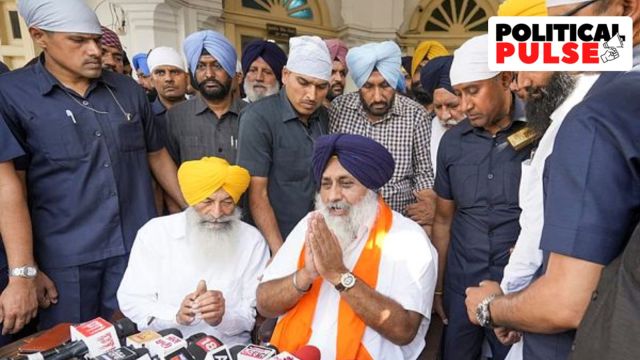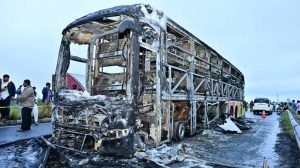Sukhbir Badal returns as Akali Dal chief, task cut out before Punjab polls as he flags ‘plot’ against party
Badal was elected unanimously by SAD delegates, five months after he was forced to resign as party president by Akal Takht over ‘religious misconduct’.
 Badal also alleged a “conspiracy” against the SAD. (PTI Photo)
Badal also alleged a “conspiracy” against the SAD. (PTI Photo)Former Punjab Deputy Chief Minister Sukhbir Singh Badal was on Saturday re-elected as the Shiromani Akali Dal (SAD) president, a post that has been held by a member of the Badal family since 1990.
About 500 delegates of the Akali Dal, who were elected by the party members during its recent organisational polls, unanimously elected Sukhbir Badal as the party chief barely five months after his resignation from the post.
Held at the Teja Singh Samundari hall at the Shiromani Gurdwara Parbandhak Committee (SGPC) headquarters in Amritsar, the SAD president’s election was among several directions on its organisational changes issued by the Akal Takht – the highest temporal seat of Sikhs – after Badal and other SAD leaders were found guilty of “religious misconduct” during the Akali Dal-led government’s tenure from 2007 to 2017.
The 62-year-old Badal was subsequently forced to resign as the SAD president last December, which was accepted by the party’s Working Committee only in January this year.
Addressing the party leaders and delegates after his return to the party’s helm, Badal said, “You all should work to bring back the SAD government (in the 2027 Punjab Assembly polls). We will take the SAD on the path of development. There will be peace and harmony in the state. There will be no gangsters and smugglers in the state.”
Badal also alleged a “conspiracy” against the SAD. “There was a big conspiracy to finish the party. It was hatched after the SAD left the NDA over the farmers’ agitation (in 2020-21). We never allowed the NDA to interfere in our institutions. But after we quit, they decided to finish the SAD in Punjab and install their own puppets in the state,” he said.
In the run-up to the SAD president’s election, the Jathedars of the three Sikh Takhts, or seats of temporal power, in Punjab were removed by the SGPC, the community’s top body for gurdwara management. These Jathedars had been involved in passing the decree to punish Badal. “They made attempts to capture the SGPC. But our SGPC members foiled such attempts. Then they captured the Sikh Takhts to finish the SAD. The SGPC Executive Committee didn’t allow this to happen,” he said, referring to the removal of the Jathedars.
Following the Akali Dal’s resounding defeat in the 2022 Assembly polls and its lacklustre performance in the 2024 Lok Sabha elections, Badal’s refusal to resign as president had resulted in many senior leaders leaving the party. With the party now largely comprising Badal’s loyalists, his re-election as the SAD president was a foregone conclusion.
When Badal first became the party president in 2008, under his father Parkash Singh Badal as the CM, the SAD had few challengers in Sikh politics. But now, with several Sikh groups emerging – from pro-Khalistan Amritpal Singh’s Akali Dal (Waris Punjab De) to the Akal Takht panel that was formed to reorganise the SAD – Badal is returning as the SAD president in a “do-or-die” situation.
While the SAD has just one MP and one MLA, Waris Punjab De has two MPs and the Akal Takht panel has one MLA. Punjab has 13 Lok Sabha seats and 117 Assembly seats.
On paper, however, the Badal-led SAD has the upper hand in terms of electoral experience and machinery. However, the challenge for Badal ahead of the 2027 polls will be creating a resonance among Sikhs. Having confessed to religious misconduct and served the punishment given by the Akal Takht, Badal will now be looking to win back the support of the party’s core vote bank.
The Badal family has not only called the shots in the SAD, but has also wielded enormous influence over the Sikh organisations like the SGPC.
Badal won his first election from the Faridkot parliamentary constituency in 1996 and retained the seat in 1998. However, he was defeated from Faridkot in the 1999 polls despite his father being the CM at the time.
From 2001 to 2004, Badal served as a Rajya Sabha MP and was a Minister of State for Industry in the Atal Bihari Vajpayee-led government. In 2004, he won the Faridkot Lok Sabha seat for a third time.
In December 2003, the father-son duo had been arrested following a summons from a Ropar special court in connection with a disproportionate assets case. A week later, a special judge granted them bail. The case dragged on until April 2023, when the Supreme Court quashed the criminal proceedings against the Badals, saying the summons issued by the trial court constituted an “abuse of the process of the law”.
In 2008, Badal replaced his father as the party president. At the time, many veteran leaders had been overlooked for the top post.
In 2009, after the Faridkot Lok Sabha seat was reserved for Scheduled Castes, Badal entered state politics through a bypoll for the Jalalabad seat and was appointed the Deputy CM, a position he held from 2009 to 2017.
As soon as he became the Deputy CM, he was considered a “CM in waiting”. But his elevation faced challenges, including from within the family when his cousin and then state finance minister Manpreet Singh Badal quit the SAD following differences with other leaders to float his own party.
Badal, however, proved his critics wrong. Under his leadership, the SAD won the 2012 Assembly election, the first party to win the Assembly polls in Punjab for a second consecutive time.
Badal also introduced a centralised organisational structure to the SAD and promoted younger leaders, which some critics in the party described as “kaka culture”. Under Badal, the SAD leaders and workers grew powerful, exerting influence even on the state’s bureaucracy. In the process, Badal won support within the party at the ground level, limiting the potential for internal challengers to emerge.
Though many in the party had hoped Parkash Badal would make way for his son to become the CM, the SAD government began to lose popular support owing to a range of issues from illegal mining, drug abuse and controversial appointments, especially in police.
In 2014, the newly launched Aam Aadmi Party (AAP) made its electoral debut in Punjab, managing to ride the anti-SAD sentiments to win four Lok Sabha seats.
The SAD’s struggles were compounded in 2015 by the Bargari sacrilege case. After desecrated holy texts were found in the Faridkot district, the police opened fire and killed two Sikh protesters. In the following years, several other such sacrilege cases had also emerged. These events contributed to the party losing its core Sikh vote bank. In the 2017 Assembly polls, the SAD was reduced to 15 seats.
The party went on to win just two seats in the 2019 Lok Sabha elections — one by Badal and the other by his wife Harsimrat Kaur. In the 2022 Assembly elections, the SAD was reduced to just three seats with Badal himself losing the Jalalabad seat to the AAP. In the 2024 Lok Sabha polls, the party won only one seat.
Ahead of the 2024 Lok Sabha elections, Badal decided against contesting to focus on campaigning. Several senior party leaders had raised concerns over his leadership and demanded a change.
In July 2024, some leaders had approached the Akal Takht with complaints of religious misconduct against Badal, who “confessed” and was declared “tankhaiya”, or guilty of violating the Sikh religious code, by the Akal Takht. Though Badal resigned as the SAD president in November, it took until January this year for the party to accept it.
Since then, despite not being president any more, Badal has remained at the helm of party affairs. He was the face of the SAD and key speaker at the Maghi Mela, one of Punjab’s most significant religious and political events, just days after his resignation was accepted.
Despite facing opposition from some quarters, Badal had been the clear front-runner for the president’s post. Even before the election, sources said the party had already given orders to publish banners and posters bearing Badal’s images and labelling him the party president for a rally in Bathinda district on the occasion of Baisakhi on April 13.






- 01
- 02
- 03
- 04
- 05

























